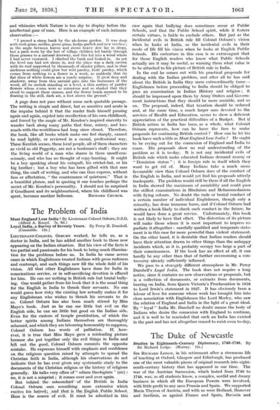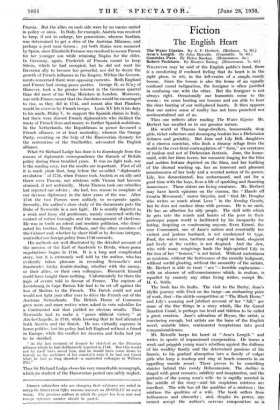The Duke of Newcastle
Studies in Eighteenth-Century Diplomacy, 1740-1748. By Sir Richard Lodge. (Murray. 12s.) SIR RICHARD LODGE, in his retirement after a strenuous life of teaching at Oxford, Glasgow and Edinburgh, has produced
one of the most valuable pieces of original research into eight- eenth-century history that has appeared in our time. The
war of the Austrian Succession, which lasted from 1140 to 1748, was; as all students know, a complex, sordid and dreary business, in which all the European Powers were involved,
with little profit to any save Prussia and Spain. We supported Maria Theresa of Austria, and with us were Holland, Hanover and Sardinia, as against Firance and Spain, Bavaria and Prussia. But the allies on each side were by no means united in policy or aims. In Italy, for example, Austria was resolved to keep, if not to enlarge, her possessions, whereas Sardinia
was determined to get a slice of the Austrian Milanese, and perhaps a port near Genoa ; yet both States were menaced
by Spain, since Elizabeth Famese was resolved to secure Parma for her younger son while retaining Naples for the elder.
In Germany, again, Frederick of Prussia meant to keep Silesia, which he had occupied, but he did not want his Bavarian ally to become too powerful, nor did he desire the growth of French influence in the Empire. Within the Govern- ments concerned there were opposing currents. Both England and France had strong peace parties. George II, as King of Hanover, took a far greater interest in the German quarrel than did most of his Whig Ministers in London. Moreover, war with France meant that the Jacobites would be encouraged to rise, as they did in 1745, and meant also that Flanders would be overran by French troops. Louis XV felt it his duty to his uncle, Philip V. to support the Spanish' claims in Italy, but there were shrewd French diplomatists who disliked the waste of French lives and money to further Spanish ambitions.
In the Netherlands, the Republicans in power favoured a French alliance, or at least neutrality, whereas the Orange Party, counting on the help of the Hanoverian dynasty for the restoration of the Stadholder, advocated the English alliance.
What Sir Richard Lodge has done is to disentangle from the masses of diplomatic correspondence the threads of British policy during these troubled years. It was no light task, nor_
is the reading easy, but the results are important. First of all it is made plain that, long before the so-called "diplomatic
revolution of 1756, when France took Austria as an ally and threw over Prussia, our relations with Vienna had become strained, if not unfriendly. Maria Theresa took our subsidies Jut rejected our advice ; she had, too, reason to complain of our devious diplomacy in the later years of the war. After 1748 the two Powers were unlikely to co-operate again.
Secondly, the author's close study of the documents puts the' Duke of Neweastle in a new light. He is usually depicted as a weak and fussy old gentleman, mainly concerned with the control of rotten boroughs and the management of elections.
He was in truth an adroit and resolute politician, who domi- nated his brother, Henry Pelham, and the 'other members of the Cabinet and, whether by sheer bluff or by devious intrigue, controlled our foreign policy from 1746 onwards.
• His methods are well illustrated by the detailed account of the mission of the Earl of Sandwich to Breda, where peace'• negotiations began in 1746. It is a long and complicated story, but it is extremely well told by the author, who has evidently taken pleasure in revealing Newcastle's and Sandwich's tricky double-dealing, whether with the enemy,
or their allies, or their own colleagues. Bismarck himself could have taught them nothing. Unfortunately for them the logic of events told in favour of France.' The capture of Louisbourg in Cape Breton Isle had to be set off against the loss of Madras to the French. The Dutch' could not and would not fight year after year to drive the French out of the Austrian Netherlands. The British House of Conlmons grew more and more restive when asked to vote subsidies for a Continental wad' that yielded no obvious results. Thus Newcastle had to make a "peace without victory" at Aix-la-Chapelle, iii 1748, while knowing that he had alienated both Austria and the Dutch. He was virtually supreme in home politics, but his policy had left England without a friend in Europe, while the conflict for America and India had yet to be decided.
"At the last moment of despair he clutchad at the Prussian alliance which he had deliberately rejected in 1748. But this would not by itself have saved him, and he would have come down to history as the architect of his country's ruin if he had not found what he had so long dreaded—a masterful colleague in William Pitt."
Thus Sir Richard Lodge closes his very remarkable monograph, which no student of the Hanoverian period can safely neglect:



















































 Previous page
Previous page